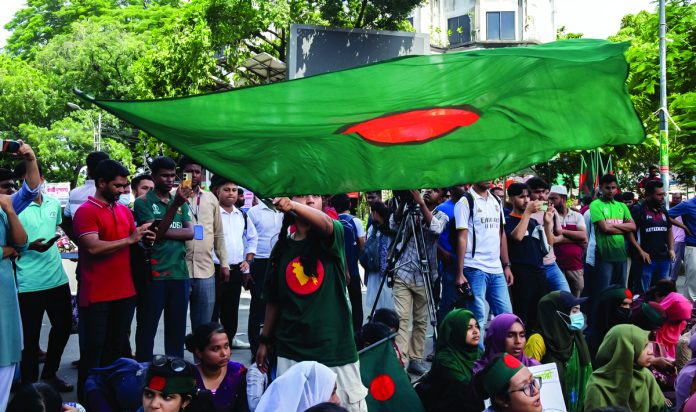Brig (R) Tariq Khalil
Bangladesh endured the second revolution this year, where it was emancipated from the Indian hold. Clamped on Bangladesh in the last 15 years. Virtually Bangladesh became an Indian colony since everything it was being controlled, from the judiciary to the economy. Bangladesh was not allowed to conduct its foreign policy outside the realm Dehi dictates and the contours given by the Indian Foreign Office. It was a question being asked both inside and outside of Bangladesh where the country is heading; the fact is what happened in 1971 was the manipulation by India against Pakistan.
Mujib Ur Rehman did not contest the election based on a separate country. The issue was provincial autonomy and the rights of the eastern wing. Since 1968, Indra Gandhi directed its intelligence agencies to penetrate East Pakistan. They succeeded in gaining access to the judiciary, education, bureaucracy, and even defense forces. The basis was the inequality and that West Pakistan was trampling on the rights of East Pakistan. Factually, the facts and figures were totally wrong, but the theme was sold to public perception. The public goes with perception, not the logic
India is making efforts to undo the existing setup of Bangla Desh. Pressure is being built up economically, politically, socially, and militarily. Indian intelligence agencies are creating a law and order situation within Bangladesh. The borders along Bangladesh are being heated up on false flag operations. 1971 refugee influx into India is being trumpeted up the world over. A vicious campaign is being run by the Indians both in the media and social media that the present government is indulging in mass killing. It is the same scenario being repeated under the Indian government’s patronage as was done in 1971.
Every social media platform is crying foul demanding the Indian Government do something to stop Bangladesh killings, especially of Hindus. Every effort is being made to thwart Bangladesh from becoming a truly independent state. The electricity being supplied to Bangladesh has been cut on the plea that around USD 2 billion are unpaid to Indian companies. In various segments of Bangladesh’s economy and Indian pressure is being built up to bend down Bangladeshis again. Diplomatically every effort is being made to portray Mr. Yunis is incompetent to run the government. Bangladesh is going to be a hotbed of terrorism against India and Pakistan is trying to pump in arms and ammunition through. Trade.
It is the same scenario as was built in 1971 through a hoax Hijacking drama created to stop the overflying a Pakistan Airlines over India. The hawkish critics are trying to make a case to ensure that the chicken neck area in the eastern side of India Bangladesh is a strategic threat and Bangladesh may resort to aggression. India should capture this territory, expand to ensure the safety of the Indian connectivity with the Eastern States.
The turbulence and the movements of Independence which are running deep in 7 sister states are being blamed on Pakistan. Boogie of Islamism is being created to gather Western countries’ support against Bangladesh. Any endeavor by Pakistan to reconnect with Bangladesh is being criticized. That proves India is not getting reconciled with the setback. It suffered after this second revolution. The basis of the second revolution lay, in what happened in 1971. Then, a situation was created to make brothers fight against each brother. Mujib Ur Rehman had no mandate for the separate country. He did not agree to any suggestion to form the government with the Peoples Party on the plea Awami League have the majority.
Principally he was right but politically he failed to see in to future ramifications whereas during March 1971 parlays government was willing to concede to almost five and a half points out of the 6 points, even Mr Brohi was summoned to Dhaka to draft a Presidential Ordinance to hand over power but the hawkish elements in the Awami League had a different agenda, they reportedly were in touch with Indians and stalemate resulted in civil disobedience. The province plunged into a civil war detrimental to each side, East and West Pakistan. Pakistan movement started from Dhaka in 1906 when the Muslim League was formed to achieve the rights of Muslims in India. It was the first time a platform for political activity was created. The East Bengal leadership championed the cause of Pakistan, having seen the attitude of the Hindu superior bureaucracy, political pressures and the economic hold. British Government resiled, and the partition of Bengal was undone in 1912. When the Viceroy presided over a Congregation in Calcutta, the song of Bande Matrem was recited in gratitude before the Viceroy. It was to become the national song of India till 1947 and thereafter, along with another song, Mana Gana. It eventually became part of India’s national anthem. Bande Matrem did not have public support initially, but when Tagore translated it into English, it became popular. In 1935 Then the Congress. Was allowed to form governments in. Central Indian Bihar and Bengal provinces. This song created hatred amongst Muslims and Hindus, resulting in massive Hindu-Muslim riots.
The sentiments in March 1971 reached a degree where the people of East Pakistan truly believed the Amami League was a liberator. Still, when things moved on towards supremacy of India in every field, the bulk of the population started realizing they were not only becoming the colony of India but were all being converted to a colony within the Indian subcontinent.
The tight control by India was the main reason for disenchantment. India is now making all efforts to squeeze Bangladesh; the electric supply is disconnected, trade orders of cotton have been canceled, the Telecom agreement has been annulled, and the situation on the borders is heated up. It is reported that a splinter group of the Arakan tribe, around 40000, in Chittagong Hills is being paid and equipped to create trouble in the Chittagong Division and split the country.
Pakistan needs to extend support socially, economically, diplomatically, and militarily. As a first step, it should open up a visa on arrival for business, academia, and relatives’ people-to-people contacts. It is suggested that a joint commission be formed between the two countries to discuss bilateral issues.
The author is a Researcher, analyst and a decorated Brigadier retired with 32 years of combat service, and 30 years as MD/COO in the corporate sector.










